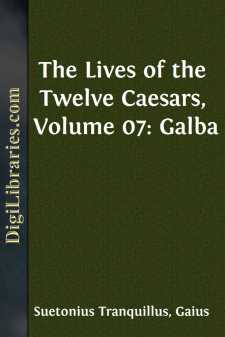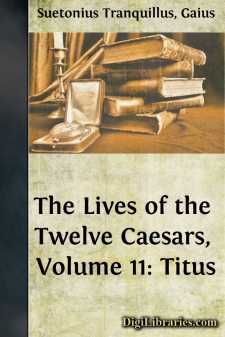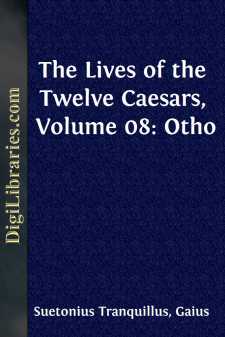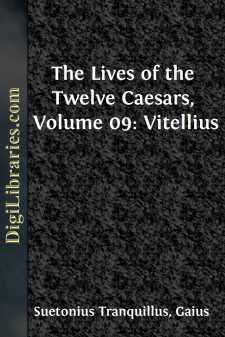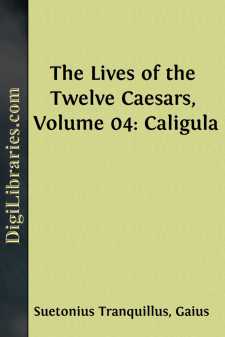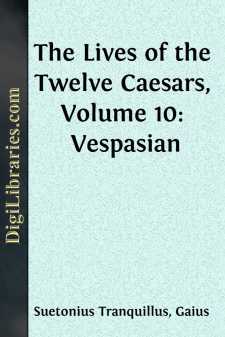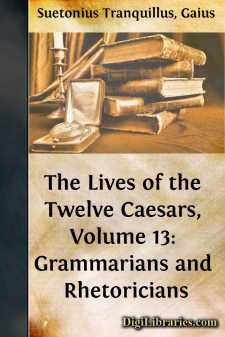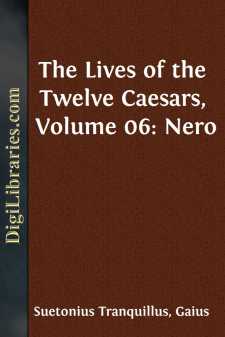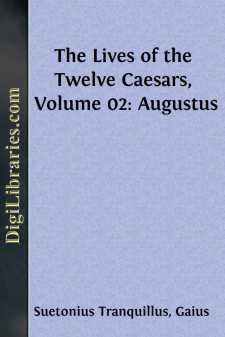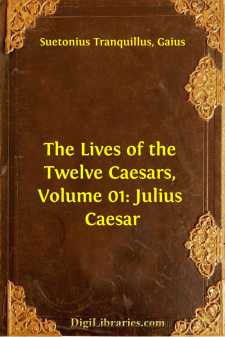Categories
- Antiques & Collectibles 13
- Architecture 36
- Art 48
- Bibles 22
- Biography & Autobiography 813
- Body, Mind & Spirit 142
- Business & Economics 28
- Children's Books 14
- Children's Fiction 11
- Computers 4
- Cooking 94
- Crafts & Hobbies 4
- Drama 346
- Education 46
- Family & Relationships 57
- Fiction 11829
- Games 19
- Gardening 17
- Health & Fitness 34
- History 1377
- House & Home 1
- Humor 147
- Juvenile Fiction 1873
- Juvenile Nonfiction 202
- Language Arts & Disciplines 88
- Law 16
- Literary Collections 686
- Literary Criticism 179
- Mathematics 13
- Medical 41
- Music 40
- Nature 179
- Non-Classifiable 1768
- Performing Arts 7
- Periodicals 1453
- Philosophy 64
- Photography 2
- Poetry 896
- Political Science 203
- Psychology 42
- Reference 154
- Religion 513
- Science 126
- Self-Help 84
- Social Science 81
- Sports & Recreation 34
- Study Aids 3
- Technology & Engineering 59
- Transportation 23
- Travel 463
- True Crime 29
The Lives of the Twelve Caesars, Volume 07: Galba
Description:
Excerpt
SERGIUS SULPICIUS GALBA.
(400)
I. The race of the Caesars became extinct in Nero; an event prognosticated by various signs, two of which were particularly significant. Formerly, when Livia, after her marriage with Augustus, was making a visit to her villa at Veii [639], an eagle flying by, let drop upon her lap a hen, with a sprig of laurel in her mouth, just as she had seized it. Livia gave orders to have the hen taken care of, and the sprig of laurel set; and the hen reared such a numerous brood of chickens, that the villa, to this day, is called the Villa of the Hens [640]. The laurel groves flourished so much, that the Caesars procured thence the boughs and crowns they bore at their triumphs. It was also their constant custom to plant others on the same spot, immediately after a triumph; and it was observed that, a little before the death of each prince, the tree which had been set by him died away. But in the last year of Nero, the whole plantation of laurels perished to the very roots, and the hens all died. About the same time, the temple of the Caesars [641] being struck with lightning, the heads of all the statues in it fell off at once; and Augustus's sceptre was dashed from his hands.
II. Nero was succeeded by Galba [642], who was not in the remotest degree allied to the family of the Caesars, but, without doubt, of very noble extraction, being descended from a great and ancient family; for he always used to put amongst his other titles, upon the bases of his statues, his being great-grandson to Q. Catulus Capitolinus. And when he came to (401) be emperor, he set up the images of his ancestors in the hall [643] of the palace; according to the inscriptions on which, he carried up his pedigree on the father's side to Jupiter; and by the mother's to Pasiphae, the wife of Minos.
III. To give even a short account of the whole family, would be tedious. I shall, therefore, only slightly notice that branch of it from which he was descended. Why, or whence, the first of the Sulpicii who had the cognomen of Galba, was so called, is uncertain. Some are of opinion, that it was because he set fire to a city in Spain, after he had a long time attacked it to no purpose, with torches dipped in the gum called Galbanum: others said he was so named, because, in a lingering disease, he made use of it as a remedy, wrapped up in wool: others, on account of his being prodigiously corpulent, such a one being called, in the language of the Gauls, Galba; or, on the contrary, because he was of a slender habit of body, like those insects which breed in a sort of oak, and are called Galbae. Sergius Galba, a person of consular rank [644], and the most eloquent man of his time, gave a lustre to the family. History relates, that, when he was pro-praetor of Spain, he perfidiously put to the sword thirty thousand Lusitanians, and by that means gave occasion to the war of Viriatus [645]. His grandson being incensed against Julius Caesar, whose lieutenant he had been in Gaul, because he was through him disappointed of the consulship [646], joined with Cassius and Brutus in the conspiracy against him, for which he was condemned by the Pedian law....


